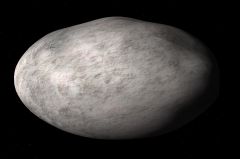Difference between revisions of "136108 Haumea"
Jump to navigation
Jump to search
(Created page.) |
m (Arvil moved page User:Arvil/Sandbox02 to 136108 Haumea: Move to article page.) |
(No difference)
| |
Revision as of 11:25, 24 October 2024
| 136108 Haumea | |
|---|---|

| |
| 136108 Haumea from Haumea.zip in Orbiter 2006P1 | |
| Designation | |
| Name | 136108 Haumea |
| Reference body | Sun |
| Planetary mean orbits | |
| Epoch | 2008.99885844749 |
| Semimajor axis (a) | 6453080988340.01 m |
| Eccentricity (e) | 0.1949506 |
| Inclination (i) | 28.2244° (0.492608709399888 radian) |
| Longitude of the ascending node (LAN, ☊) | 122.1032° (2.13110286722114 radian) |
| Longitude of periapsis (ϖ) | 1.17525844097384° (.0225121293568489 radian) |
| Mean longitude (L) | 203.95904° (3.55975678720682 radian) |
| Selected physical parameters | |
| Mean radius | 745000 m |
| Mass | 4.2×1021 kg |
| Rotation elements | |
| SidRotPeriod | 27990.7401800156 seconds (7.7752 hours) |
| SidRotOffset | 0 |
| Obliqutiy | 4.09803308368269 |
| LAN | 0 |
| Note | *Elements given are from Haumea.cfg (Haumea.zip) |
'136108 Haumea (2003 EL61 is a Dwarf planet and a trans-Neptunian object, discovered by Mike Brown and his team at the Palomar Observatory in March 2003. It also boasts two moons, Hiʻiaka and Namaka. Haumea also has a ring discovered in January 2017.
136108 Haumea in Orbiter
Haumea was introduced to orbiter with the release of Haumea.zip add-on in November 2008.
| Add-on | Source | Version | Author | Type | Release Date | Compatibility | Wiki article |
|---|---|---|---|---|---|---|---|
| Haumea (2003 EL61) v2.0 | O-F Resources | v2.0 | Piper | Scenery | 4 November 2008 | ||
See also
Gallery
Animation of images of Haumea and two moons taken by Hubble in May 2020
from Wikimedia Commons
| edit The Solar System | |
|---|---|
| Central star |
Sun (Sol) |
| Planets |
Mercury - Venus - Earth - Mars - Jupiter - Saturn - Uranus - Neptune |
| Natural satellites |
Moon - Phobos - Deimos - Io - Europa - Ganymede - Titan - more... |
| Add-ons |
Planets - Dwarf Planets - Small objects - Natural satellites - Alternative star systems |

